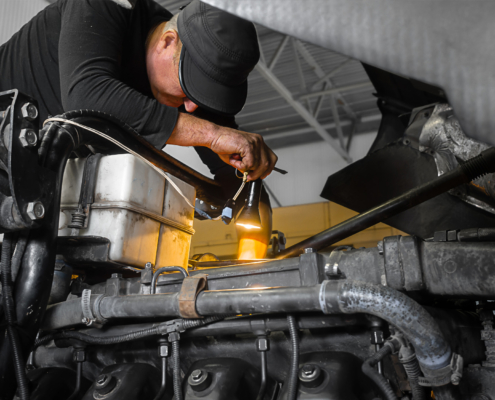
Seasonal Tank Truck Maintenance: Summer Prep and Beyond
Tank Truck ServiceSeasonal tank truck maintenance keeps fleets safe and productive. Discover summer prep steps and winter insights to reduce downtime.
Industrial blowers are a significant investment for any operation, and their constant functioning is important to the overall productivity of a business. Therefore, preventative blower maintenancechecklists should never be overlooked.
Blowers are critical components in many industrial processes and applications. For trucks, the ability to vacuum and dispense dry materials is critical for industries like construction and trucking companies. Regular maintenance on the blowers and proper blower maintenance checklists help ensure optimal performance and prevent unexpected downtime or failures.
Lack of maintenance can lead to blower failure through:
This leads to unplanned downtime, secondary damage, and safety risks for workers.
Regular blower maintenance:
Overall, maintenance keeps blowers working at peak efficiency for savings and safety. The improved conditions of your blower and drive shaft (what connects the blower to power take off, or PTO) will keep you from forking out cash for costly repairs earlier in your equipment’s lifespan.
Keeping up with your preventative blower maintenance doesn’t have to be a headache. A comprehensive blower maintenance program should include:
Clogged intake filters increase strain on blowers, leading to failures. Routinely check and replace filters as needed.
Worn belts slip off pulleys, causing blowers to seize up. Inspect for proper tension and signs of wear for blower parts. Replace as required. The drive shaft is what connects your blower to power take-off (PTO) and gives it power from the engine. When the slip yolk isn’t properly greased, it can vibrate too hard and fail. Failures like this result in downtime and costly repairs.
Increased vibration or noise can indicate emerging blower problems. Track using log sheets to catch issues early. Any obstructions that could cause unnecessary vibration or tension should be dealt with right away. Inlets and outlets need a thorough examination.
Lubricants reduce friction in bearings but need regular top-ups. Ensure levels meet equipment guidelines. In addition, check bearings for leakage and keep your engine in tip-top shape at all times. An ounce of prevention is worth a pound of cure later on.
What should you do if you inspect your blower and decide you need maintenance? What kind of blower needs certain services? The answer is simple: tailor the maintenance to specific blower designs, and call in a professional.
Prioritize belt, bearing, and seal inspections on these dynamic blowers. Check clearances between rotors and housing.
Closely monitor internal wear on contact surfaces—Lubricate screws and gears per OEM specs to prevent failures.
High speeds put extra stress on components. Routinely verify bearings, electrical terminations, and heat levels on motors.
When lights come on in your truck, it is vital to diagnose the problem and get it fixed right away. In this article, we explain the importance of accurate truck diagnostics, and how to get it.
A proactive blower maintenance plan is essential to prevent failures, maximize uptime, and reduce costs. If you are unsure where to start, consulting professionals for guidance is a great resource. Here are vital steps to build an effective strategy:
As a first step, thoroughly review your current blower maintenance procedures. Consider the following questions:
Analyzing this data will reveal gaps that can inform the maintenance plan. If you feel as if your current partner is not servicing your blower correctly, consider revisiting your contract or exploring other companies for future maintenance plans.
Provide specialized training to all personnel involved in blower maintenance. Emphasize:
Ensure everyone understands their roles. Refresh training periodically to maintain skill levels.
The maintenance plan must designate specific tasks and optimal frequencies based on the following:
Balance proactive care while minimizing production impacts. Coordinate planned downtime with operations staff.
While regular in-house maintenance is essential, expert assistance is often preferred.
Consider contacting professional services if you encounter the following:
Their expertise can optimize equipment reliability and lifetime value.
When choosing external services, consider providers who offer:
Evaluate experience, service capabilities, and qualifications to pick the best partner.
Dissatisfied with your current blower maintenance checklist? Enter White Tank & Truck Repair. Our over 30 years of trucking experience make us a perfect partner for the blower issues that keep your business running smoothly. Don’t wait for your equipment to fail on you, contact us for quality preventative blower maintenance today.

 What Is a Wet Kit?
What Is a Wet Kit?